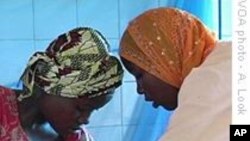<!-- IMAGE -->
In the fight against maternal mortality, Senegalese health workers say getting women to come in for consistent prenatal care can mean the difference between life and death. Our correspondent reports from Kolda, Senegal, that getting women into prenatal clinics has proved to be a difficult task.
Mamadou Juba Diamanka's second wife, Ousu, died just weeks after giving birth to their third child. She was 22-years-old. The baby died before his first birthday. Years later, he still takes out a worn photo every day to study her face.
Diamanka says he misses Ousu a lot and looks at her photo all the time. He says his wife was pregnant. She was very sick. She had problems with her stomach during her pregnancy. He took her to a neighboring village when she was eight months pregnant, and she was transferred to the hospital . He says she was there for 17 days before she died.
Diamanka lives with his first wife and eight children in Saare Gagna, a village in the Kolda region of southern Senegal.
Senegalese health officials say poverty, poor roads and lack of medical care give Kolda the country's most alarming rates of maternal and infant mortality. It is a risk that begins long before the delivery room, and they are struggling to get rural women to come in for the prenatal care that could have saved Ousu and her baby.
About 150 babies are born every month at the regional health center in Kolda, but today the waiting room for prenatal consultations sits almost empty.
Meissa Gueye is one of four midwives at the health center. Gueye says mothers struggling in labor are brought in from the villages on horse carts and on the backs of scooters, only to die as they enter the exam room.
Gueye says that when a woman comes to us on time, she is monitored and accompanied all the way up to the birth. In those cases, she says the care of the mother and the infant will be much better than cases where a woman is pregnant and we have not seen her. Gueye says the majority of problems that they see are the women who live too far away, who have not benefited from pre-natal consultations and who come with anemias or hypertensions that are so advanced health workers cannot save them.
Anemia and high blood pressure make childbirth more risky and contribute to premature and low-birth-weight babies. They are two danger signs that can be identified and treated via prenatal visits. The prenatal consultations are free, and Gueye says women should come in for at least four checkups beginning in the first trimester.
In rural regions like Kolda, woman often hide their pregnancies and do not come in for consultations until the fifth, sixth or even seventh month. A woman may also need the consent of her husband or mother-in-law to come to the health center, and village traditions may forbid pregnant women from eating foods like meat, eggs and milk, leading to malnutrition.
Because of this, health workers like Meissa Gueye travel to villages to educate families and reach at-risk women before it is too late.
Senegal's government is taking outreach efforts like Gueye's nationwide with a new program that trains ordinary women to counsel their pregnant neighbors and encourage them to get pre-natal care.




